
The June 6, 1944 invasion of Normandy marked the beginning of the end of World War II. Planning for what would be the largest seaborne invasion in history began in 1943. In the months leading up to the invasion, the Allies conducted substantial disinformation regarding the date and location of the main landings in order to mislead the Germans, who were spread thin throughout northwest Europe. The amphibious landings were preceded by extensive aerial and naval bombardment and the landing of 24,000 British, U.S., and Canadian airborne troops shortly after midnight. Allied infantry and armored divisions began landing on the coast of France at 6:30 in the morning.
In addition, glider missions were sent in on June 6 and just after daybreak on June 7, delivering the 325th Glider Infantry Regiment to the 82nd Airborne. Consisting of 100 glider-tug combinations, it carried nearly a thousand men, 20 guns, and 40 vehicles. By 10:15 in the morning, all three battalions had assembled and reported in with 90 per cent of its men present. Henry Bardach, who was born in Germany and then immigrated to the U.S., describes his experience as part of the 325th and how he came to be “the first GI with a typewriter to land on Normandy.” Karl Mautner, who was born in Vienna, describes his initial experience as a paratrooper.
Another part of the war effort was fought not on the beaches, but in the broadcast studios of London and focused on news and propaganda broadcast in German from the newly created Voice of America. Robert Bauer, who also was also born in Austria, describes how he ended up being the first person to announce to the world that the invasion of Normandy had begun. Bauer was interviewed by Cliff Groce beginning in October 1989. Mautner was interviewed by Thomas J. Dunnigan starting May 1993. Bardach was interviewed by Charles Stuart Kennedy beginning March 1996.
You can read other Moments from World War II, including Fredrick Irving’s account as a POW.
“I was the first to announce the invasion, from London”
Robert Bauer, Voice of America (VOA), London, 1944
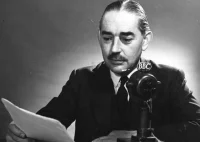
BAUER: Prior to the invasion of ’44 we began to organize the American Broadcasting Station in Europe – ABSIE….It was the regular pattern: news, commentary… Then there was the Voice of the Neutrals, in which we had Finnish and Swedish and Danish newspaper quotes and Americana. In the morning we got guidance from Broadcast Control, and we also got monitoring reports….(Photo: BBC)
We were located just next to the English service, and who should be sitting there writing away but Howard Fast. It always amused me that after all the Communist talk during the McCarthy period, nobody recalled that we did have Communists working there during the War, like Howard Fast. [Note: Fast wrote for the Communist newspaper The Daily Worker in the 1950s and would become a famed novelist who wrote Spartacus and later How the West was Won.]
And the head of the Czechoslovak service was a Mr. Hofmeister who, when the Communists took over in Czechoslovakia in ’48, became the first Communist ambassador to Paris. So we had a few of them; there was no doubt about it….
By that time, the closer we got to the invasion time the more we got into signal-sending. In the evening a courier came and handed me a note. You will broadcast the following message throughout the evening: “Aunt Anna has a cold. Repeat, Aunt Anna has a cold.” Or: “Tuesday will be nice weather.”
Q: These were signals to the underground. Did you just insert them into the program, or in the middle of the news?
BAUER: Oh, no, no. We’d say, “Here are a few messages,” and read them. Then there came the famous moment when they handed me a note, just before the invasion and it said, “Fishermen, longitude so-and-so, latitude so-and-so. Stop fishing and make for port.” We looked at the map every day, and one day it was the Danish coast, then the Norwegian coast, then it was the Belgian coast, and then it was the French coast.
A famous joke came one evening after we had done this for the umpteenth time. We finally said, “Tomorrow we are going on the air and say, ‘Fishermen, fish!'” (Laughter) Anyhow, we learned later that it had an effect, that (a) fishermen did make for port, and (b) it did apparently confuse the German intelligence as to where the landing might be.
Now, the interesting thing was that with all this strict security, there were things which were the opposite of secrecy. You could guess what was happening. One or two days before the invasion we were asked to make available a staffer to be detached to go over for a special assignment, but he would have to be able to speak French fluently. You don’t go to Norway and speak French. (Laughter) Well, those things were happening. But we got through it….
And then came what to me was the greatest day — I say this without trying to be dramatic — the greatest day of my life. I was about to leave the office on June 5th when I was told to please stay — I was living in the Hotel Cumberland — just stay there, and please put your uniform on. (Our uniforms were like war correspondents’!) And take some chocolates or something to have to eat — which was a strange thing — and wait to be contacted. So, I waited.
Then came a staff car, and whoosh!, so long. We come to a big building. BBC was located there to a great extent. In I went. ID card….To the elevator here, one more ID card showing. Tommies [British soldiers] with guns. Up in the elevator….When we had to go to the men’s room, a British soldier went with us.
Suddenly we heard a lot of airplanes overhead, in waves, and it was shortly after midnight when a door opened and an American general…came in. He unfolded a large paper, which was a map of France. He looked at his watch and said, “Gentlemen, in five hours and 14 minutes…the Allied troops will land in Normandy.” That’s when your heart stops. He said, “Now, here’s the briefing for your background.”
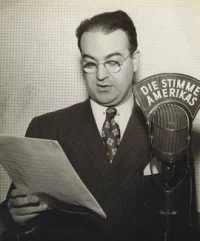
Then he gave each of us a paper. It was the sequence of broadcast announcements: King George VI, President Roosevelt, General Eisenhower. Item 6, I’ll never forget, was “Local monarchs.” (Laughter) The local monarchs included King Haakon of Norway and Queen Wilhelmina of the Netherlands. The one name missing was Charles deGaulle, because as we found out later, he held out for any number of things that had to be promised to him. Finally, at about four o’clock in the morning they rushed in and gave us the deGaulle statement….
When I left the night before I told the staff the night shift should stay on duty until they heard from me. So we sat down to do a broadcast, and the broadcast created itself, with General Eisenhower and all the other statements. The only thing was, what do you do to start? “Hier spricht die Stimme Amerikas,” [This is the Voice of America] — and then what? The only thing that came to my mind, and this is what I wrote down, was “Der Sturm aus dem Westen hat begonnen.” [The storm out of the west has begun.] So we were ready. (Pictured: Walter Roberts)
Out came the waves of airplanes — by now it must have been close to six o’clock in the morning — when I was suddenly called and rushed down to a staff car. We breezed through the empty streets to Soho. We had an arrangement with the BBC that we followed each other, every 15 minutes, with our German programs. So it happened that when I got in, the release time came and so, Go on the air. Off we went a few minutes before six. If it had been 15 minutes later it would have been the BBC.
And this was by sheer coincidence that I was the first to announce the invasion, from London, strictly by sheer coincidence of time. For the next days the broadcasts wrote themselves. Continuous communiqués and so forth….[They were] a few hours off, but [they were] up to date.
Q: They were not trying to conceal or withhold information if things didn’t go our way?
BAUER: Oh, no, no, no.
Parachuting into Normandy
Karl Mautner, Paratrooper
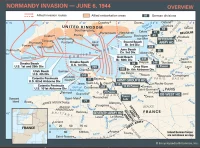
MAUTNER: I was born on the 1st of February 1915 in Vienna and worked there, went to school there, was a very poor student, and joined the Austrian army in 1935 for a year….I arrived in the United States on the 29th of February [1940], a peculiar date, on a bitter cold day in New York. Then two days later I took out my first papers, and went to work as a baby and dog photographer….
I was picked for OCS [Officer Candidate School] in Fort Benning, in the nicest time of the year in Georgia — July, August, September. After that I was sent to Camp Ritchie which was sort of the intelligence and language center, graduated there in the winter and was shipped out to England in January ’44.
In England I volunteered for the paratroopers with a friend of mine from Vienna, Alfred Diamand, who [later was] a professor in Bloomington, Indiana…. When the recruiter came around, we looked at each other and said: “Who shouldn’t volunteer but us?”…
On D-Day, I was pretty far back in the airplane, which meant a very short opening of the parachute and I was right away on the ground. As the plane disappeared in one direction, I figured I had to go in the opposite direction because I had no idea where I was. I was in the middle of a field, surrounded by cows, and nobody else around. (Go here to read about Britain’s dog paratroopers.)
I started walking and being careful about what I was doing, and about the noise I was making. Then I was challenged by some of our people — we all had those click, click, click things. The password was called “flash,” and you had to answer “thunder.”
They didn’t like the way I pronounced “thunder” [because of his German accent] and I heard the noise of readied rifles. That was a bit hairy, but one of them eventually recognized me and about five or six of us then wandered in the same direction I had started out, and wound up about 11 a.m. instead of 4 a.m. in Sainte-Mere-Eglise, where we had our designated drop zone and rendezvous site. Then things just went on.
“Which one of you isn’t going to jump? Fine, you’ll go by glider.”
Henry Bardach, 325th Glider Infantry
BARDACH: I was born in Dusseldorf on the Rhine in the Western part of Germany. I was born in 1921. This was fairly recently after the First World War, and the shadows of that war were still very much with the country, with the city, with my family….My family did eventually move in 1936.
Now [in 1944] I was part of an intelligence team. The military and our army was then getting ready with the planning and implementation of Overlord, the Normandy invasion. Being still young and looking fairly fit, they decided that I should go with a team that was going to go with none other than the 82nd Airborne Division led by General Ridgeway with other luminaries such as General Gavin who later on became an ambassador.
My team went to the division, and there was another team. There were three parachute regiments and one glider regiment, the 325th Glider Infantry. We were introduced to the G-2, the intelligence chief of the division, a very tough colonel. He greeted us at his place. He said, “Well, all of you. You are all going to jump, of course.” Only some of the people, like Karl Mautner, for example, had jump training. “Which one of you isn’t going to jump?”
We kind of meekly raised our hands and he said, “Fine, you’ll go by glider.” That was the beginning of my glider experience.
I did have some training in England with the glider people, but gliders were not considered a voluntary specialty. I felt that gliding sounded like a very smooth way of going across to France. We were assigned to the commander of the 325th Glider Infantry, and of course, being intelligence specialists, we all were involved in what you might call micro planning for the invasion. The macro planning, the big picture of course was done more in London, but we were components of it, and we went into Utah, one of the beaches, Omaha and Utah beach.
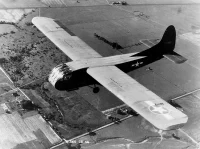
We obviously helped in trying to figure out how best to implement the strategy. The whole idea of the glider landing was a theory that had been developed by the military. I don’t think it was essentially by the Germans but the Germans weren’t using gliders anymore, called vertical envelopment. The old style envelopment you would surround the enemy. You have a frontal attack, but you also have an attack on both sides and try to come around.
With vertical envelopment, the idea was the infantry waves come across the Channel and land, but in the meantime we drop either before or simultaneously paratroopers and support these paratroopers with gliders that come by air. So we had a great deal of material that we had to wade through like the mayors of the various cities, like Sainte-Mere-Eglise etc., in Normandy the different areas of topography.
We had photo intelligence, nothing like what is available now. It was pretty rough, plain stuff, but we had photo intelligence which we could use to take a look and see where we might land. That was the preparation for the big day which, of course, was delayed as everyone knows. That is part of history that the invasion was delayed by a day.
I might mention here that we were already sitting in out glider when we were told, no, it has been postponed again.
On the sixth of June then, the first wave actually went in minus D, three or four hours during the night. Those were the paratroopers. Then we staggered the gliders. Many gliders would take off together, but, of course, you couldn’t have a whole glider regiment go off all at once. The morning, midday, late on D-Day, there were glider contingents that came in.
I was in a glider. The American gliders were a bit smaller than the British, which was probably an advantage. We had about 18 people or so in a glider. My glider had a mixture of people. It was a support group. It had the intelligence team, four of us, some medical personnel, regimental headquarters personnel, one or two chaplains to help us with our prayers. That was it.
We went; we could see it was daylight, of course, then. We could see what was happening. Glider operations are fraught with different unexpected vicissitudes, and there was, of course, a lot of anti-aircraft fire. The pilots of the tow planes obviously wanted to get away from these things as much as possible.
For all intents and purposes, very few of the gliders landed where we thought we would be landing. I remember watching gliders that were in definite trouble. You could see that. Obviously we were hoping we would remain intact and come down smoothly, which we did.
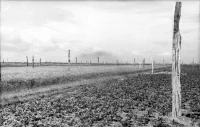
The Germans, of course, had anticipated this, an airborne assault, and had placed into the fields of Utah beach at Normandy, the so-called “Rommel’s asparagus,” which were poles which were tied into mines or other explosives.
Also they felt that this would be useful against land assault groups like personnel carriers, tanks and what have you, but particularly for the gliders they had some of those.
Then they inundated the fields. They let water come running into the fields thinking that well, if we can’t get them any other way, maybe we can drown them, the enemy. This turned out to be a boon for us because the water was not that deep. It was not that much water, maybe just a few feet. Where we landed, there was water. We landed in this puddle of water, and it actually smoothed the landing. It was like landing in a seaplane.
I found I was sitting in water up to my waist. My famous phrase for that, I had wet pants in more ways than one.
“I was the first GI with a typewriter to land on Normandy”
I was carrying a carbine rifle in my right hand. Incidentally, we had to be careful with anything hard like a rifle butt or the end of the rifle, because if it punched into the side of the glider, a glider is a very flimsy thing. It was easy to punch a hole into the side of the glider which would not have been a very good thing because air comes in and whatever.
In the other hand I had a typewriter to make immediate reports on any intelligence findings of any value that we had. I was very eager to preserve this typewriter, so I remember I got out of this thing, and I think my carbine was pretty wet. I also had a pistol so I held my typewriter high. I claim, although that claim could be disputed perhaps because this was a long beach and there were other people, but I had a claim that I was the first GI with a typewriter to land on Normandy. I haven’t had anybody dispute this except possibly correspondents. There were about 20 reporters that came over, not with the airborne but with the boat landings.
Then there was confusion. Confusion because we obviously had to regroup. The landings had already begun, but several miles back it was very much in turmoil. It was very difficult to know where there were pockets of German resistance and where the Germans were. Our instructions were to regroup as a regiment with the different companies.
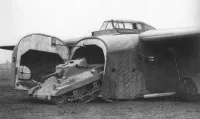
My first task, with two or three other colleagues, was to find regimental headquarters wherever they might be regrouping. That took a little while to get ourselves organized. It took several hours as a matter of fact. I believe the first night we just slept wherever we felt it was safe to sleep and stayed there.
The great danger were the snipers. The Germans had left behind snipers. Some of them were Germans; some of them may have been local, that is German local loyalists. Because of the topography — the hedgerows…and quite a few trees — it was very difficult to know where a sniper might be hiding. I think that was the most immediate danger were those snipers, or possibly German patrols. You may have seen the movie, The Longest Day, which was reasonably accurate.
There were German patrols running around — you didn’t know but you might come face to face with a patrol. The paratroopers had this little clicking device like a little frog you would click, but the Germans got wind of that, and I think there were some instances where they fooled Allied forces.
The first task, of course, was to see if there were any prisoners. The division went into action very quickly. We had to because we had some bridges across the Merderet River, I believe, that needed to be taken. The paratroopers were on these bridges and were trying to hang on to them. It was a tough job, and they needed the support of additional infantry. The paratroopers and the glider infantry were able to help them there. We did get some prisoners right away.
There were quite a few of these prisoners, I would say always except for the SS divisions or so, most of the prisoners were what you might almost say voluntary prisoners. Not all, but they knew the time was up and they were quite happy to [surrender].
They had some divisions that were poor divisions. That was our good fortune. There were a lot of young people that had been recruited. Terribly young people, it was criminal. There were guys as young as 16 or 17 thrown into these divisions. They were not unhappy to become prisoners, especially prisoners of the Americans. I mean that was a fair place to go. We interrogated; we tried to match this information with what we possibly had already.
We made reports, then immediately we had to advise the divisional headquarters, our regimental headquarters G-2. I used to go with them directly. That was also a very tricky business because we had to try to figure out where there was greater resistance and who they were and what they were. That was quite unnerving because we would be talking with a captain of a battalion or even a company, then they would go a few hundred yards down the pike, the hedgerow, all very narrow paths. The next thing we knew we heard the guy had been shot and killed. It was pretty difficult because obviously you can’t tell a person you won’t get killed.
Moving intelligence is not an easy task when the enemy is shifting things around all the time. I feel that it was a useful function. There were many reasons why we succeeded with the invasion, but I think the enormous resources we brought to bear, the good preparation, the enormous resources of manpower and logistic backup that was incredible. The work of the backup, the intelligence, all of these functions, we were a big country and we had the resources. In some ways we were almost luxurious in our ability to do things; I think that helped a great deal.

The other side of the coin, we had a tremendous amount of flexibility. Generally speaking, in American society we like to delegate; we don’t try to keep control. A good corporation president probably tries to delegate things, and I think that [General Dwight] Eisenhower was quite right to give the different corps commanders and division commanders a considerable amount of flexibility. Once the objective was laid down, then to meet that objective, you could even depart from some of the guidelines and do things slightly differently if that was in the interest.
The Germans didn’t have that. The Germans had to take everything back, and then you remember the famous story; they called Hitler.
Q: They wouldn’t even wake him up for awhile. Then he withheld the 21st army or something up around the Pas de Calais.
BARDACH: We went back after 33 days, back to England, rest, more training. September, the invasion of Holland, again airborne with gliders. That was Market garden. Then landed there in Holland and were pulled back from there into a reserve position in Soissons in France where we were supposed to stay presumably over Christmas getting ready for the final push into Germany to back up that push and then take on an occupation role. That, of course, didn’t happen because of the Battle of the Bulge. So, we were pushed back because of the Battle of the Bulge to help plug the hole….
I think we were quite successful in that. This is why the Germans weren’t successful with the Bulge because we unbulged the Bulge. We punched holes in it, and the air came out, and that was it. Then they didn’t really try it again. We moved over towards the Rhine; we were in Cologne for a spell, and then gradually moved up into Westphalia and then moved across Westphalia into what later became East Germany, Mecklenburg where we met the Russians. Two days after we met the Russians, V-E [Victory in Europe] Day was declared, that was in May of 1945.
